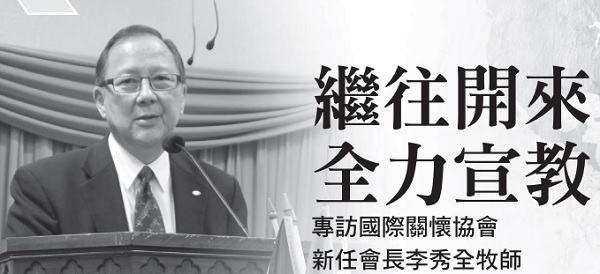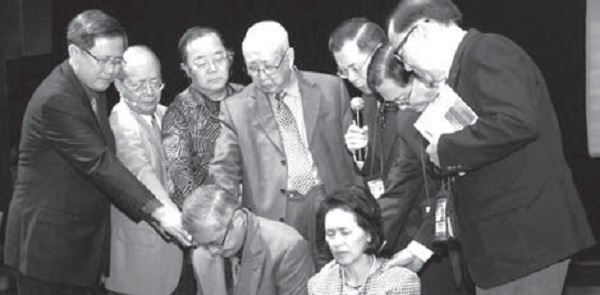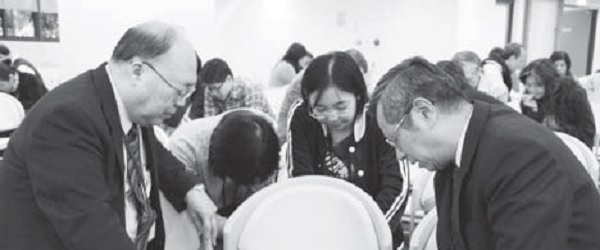Carrying forward the past and opening up the future with all-out missionary work
Exclusive interview with Pastor Li Xiuquan, the new president of CARE International
Interview/Yu Guoliang

Thirty-five years ago, the author went to Harvard for study and had the opportunity to attend the Chinese Bible Church in the suburbs of Boston. I met Pastor Li Xiuquan and his wife who had just become the pastor. I often listened to their Bible teachings, which became a great blessing in my life.
Seven years ago, Pastor Li was preparing to take over as the director-general of the World Chinese Blessing Center. He had the opportunity to interview him and wrote the article "The Good Shepherd of Missions", which was published in the first issue of "Kingdom of God Magazine". Now, at the age of seventy-two, he has just stepped down as the director-general of Huafu and immediately assumes the important responsibility of the president of CARE International.
Why is he willing to put “retirement” aside? Why is he so drawn to missionary work? Through this exclusive interview, not only were the questions answered, but the aspirations were also inspired. May the Holy Spirit who inspired Pastor Li to preach courageously also move all readers to spread the gospel until the Lord returns.
Yu: When you served as the director-general of Huafu from 2006 to 2011, you vigorously promoted the vision of world missions. Based on your observations and experiences, please share what you are most grateful for and what challenges you face regarding the achievements and prospects of the Chinese church in global missions:
plum:Thirty-six years ago, Pastor Wang Yongxin began to promote the Huafu movement, expecting Huafu to play three roles in particular: 1. Servant; 2. Bridge; 3. Prophet. First of all, what I am most grateful for is the trust, cooperation, acceptance and support given to me by the directors from all over the Huafu region, the co-worker teams in the 69 districts, and the Huafu Standing Committee and Executive Board during my five-year term. In addition, Huafu Financial Consultants gave me encouragement, a lot of support in prayer and money, and I have established a deep relationship with more than 20 co-workers in Hong Kong who work together to serve.
Secondly, I would like to thank the Lord for allowing Huafu to hold different forms of gospel conferences in various places. Regardless of whether it is a gospel conference in Africa, New Zealand, Australia, North America, Pan America, Europe, elders, sisters, grassroots people, etc., at each conference we see the Lord’s special favor, and everyone responds enthusiastically to missionary challenges.

▲At the Nianhuafu Conference, Pastor Li Xiuquan (far right in the back row) and other pastors prayed for Pastor Chen Shiqin and his wife, so that they can successfully pass on the legacy of the General Secretary.
The last thing I want to be grateful for is that a year ago, the director-general of Huafu was successfully handed over to Pastor Chen Shiqin, who is twenty years younger than me and is fifty-two years old this year.
As for the biggest challenge, I would like to use a Chinese proverb to describe it, which should be very appropriate, that is: "It is difficult for a skillful woman to make a meal without rice." First, the global Chinese church needs many "smart women", and we must earnestly plead with the Lord to raise up more of missionaries. Second, the universal Chinese church needs “meter”, which is material support and cooperation. Third, the global Chinese church needs “cooking”, which is the fruit of the holy work. Of these three challenges, the most important is the skillful woman, the worker. Only with good workers can we have good jobs; only with the right workers can we have the right jobs.

▲It’s hard for a clever woman to make a meal without rice. Among the missionary challenges of the universal Chinese church, the most important one is the right woman, that is, the right worker. are you ready?
Yu: From your point of view, what are the major events related to "the gospel going out of China" that God will do in the future?
plum:Thirty-six years ago, Pastor Wang Yongxin had already put forward Hua Fu’s slogan: “Chinese churches, one in the world, preach the gospel widely until the Lord comes.”
In the past five years, Huafu’s goal and vision have been: “Gospel into China” and “Gospel out of China.” On the premise that the gospel came out of China, I was deeply impressed by the second half of Luke Chapter 12:48: “For to whom much has been given, much will be required from him; and to whom much has been entrusted, of whom much will be required.” God. The idea of taking much and asking for much comes from God’s abundant giving and much entrusting. There are Chinese and Chinese churches all over the world. We are uniquely blessed because God has prearranged various holy works for the gospel to go out to China. I believe He will accomplish this through the Chinese church:
1. Preach to the 1.4 billion Muslims who are more than the Chinese people.
2. Mission to the Jews, because the Bible predicts that the entire family of the Israelites will be saved, and the Chinese and the Jews have many similarities in their cultural backgrounds.
3. Preach the gospel to Hindus, a huge group of people who have not yet converted to Christianity.
Of course, if we want to add two more big things, it is to preach to Buddhism and Taoism.
Yu: Why did you decide to take over as the president of CARE International after stepping down as the director-general of Huafu?
plum:I am seventy-two years old this year. I did not retire after taking the post of General Secretary of Huafu because the word "retirement" cannot be found in the Bible. My mentor, Inland Mission missionary David Adler once said that retirement in English means to replace old tires with new ones and continue to move forward.
I have another explanation for this word. Tire is very tiring, and Retire is even more tiring. Thank the Lord, today is not a question of whether we are tired or not, but when we serve the Lord, we have to answer the question: “Who are you working hard for and who are you busy for?” If I know who the person I am busy serving is, then the busyness is valuable and meaningful, and the hard work is nothing. Today is a very busy era, and it is wrong for people to complain about being busy. But the real problem with Martha is not that she is busy, but that she is "busy" with many things.
In 1997, I founded CARE International in Hong Kong. In 2002, I also established branches in Taiwan and the United States to promote ministry. Now there are branches all over the world. Because I am the founder, the association wanted to find me to continue leading this ministry forward. I felt guilty that I was holding multiple jobs in the past and was unable to devote myself fully, so I decided to come back. However, I didn’t expect to come back as the president. This means that my past ministry was not successful and I must redo it.(a knowing smile).
Yu: No, Pastor Li, you are too humble!
plum:I am happy to accept the challenge of changing careers, and of course I hope to find a younger and suitable successor in the future.
Yu: Since there are so many Chinese or Western missionary organizations, why do we need to establish CARE International? What is God’s special commission for Care International?
plum:"Gospel into China" and "Gospel out of China" are the vision of CARE International. "Gospel into China" has a history of two hundred years. The implementation of the vision of "the gospel going out of China" did not start with me. In fact, as early as 70 years ago, Robert Alexander Jaffray, a missionary from Canada, led some Chinese co-workers to missionary work in Southeast Asia. In the past, due to wars, the Chinese church did not do enough in this regard. I have only reiterated this vision over the past ten or twenty years.
I feel that there are not too many Chinese missionary organizations, but too few. Official statistics put the number of Christians in China at 23.5 million, but some estimate it at 130 million. It's difficult to make accurate statistics, so just take the middle value of 50 million. If one missionary was sent out from every thousand people, there would be as many as 50,000 missionaries scattered throughout mainland China today. Even if there are ten Overseas Christian Missions (OMF), they are not capable of sending out 50,000 missionaries. It is really urgent to establish a missionary agency, especially in today's China. We cannot have just one missionary association, we need to break it up into parts. What matters is not the number of missions, but the coordination. If resources can be used mutually and co-workers can pray together, I believe that thousands of missions will be needed!
Yu: How does CARE plan to cooperate with other missionary agencies? Please give an example.
plum:The "most important thing" in cooperating with other organizations is not meetings, but prayer! At the headquarters of CARE International in Los Angeles, USA, missionary prayer meetings have been held for the past eight years to combine missionary work and prayer. From April 20th to 21st this year, representatives of 13 local churches and institutions in Los Angeles gathered together to pray together and share the burdens in their hearts. It was very beautiful.
Of course, we have missionary prayer fellowships in various places such as Canada, New Zealand, Taiwan, Hong Kong, and the United States. We particularly emphasize the relationship between missions and prayer, and put forward the slogan “Don’t forget to pray when preaching, and don’t forget missions when praying.” "Don't forget to pray when you are on mission" is said to missionaries. That is, in addition to having good activity arrangements and equipment training during missionary work, don’t forget to pray. "Pray not forgetting missions" is addressed to the church. The church holds prayer meetings every week in the hope of launching a movement. Each prayer meeting will spend five or ten minutes praying for world missions.


▲The relationship between missionary work and prayer is inseparable. In addition to having good activity arrangements and equipment training, missionary work must not neglect calling on the Lord to pray at all times.
We encourage theological students to sign up for Mission Field Training (MFT) in Thailand. We are negotiating with seminaries in Myanmar and Cambodia to allow seminarians to receive credits after spending eight weeks in the summer. We call it the Summer Cross-Cultural Mission Internship and Training Course. Seventy people have completed this training in the past, and the number is increasing year by year.
Five of these seventy people are already serving in the mission field, and two have completed their two-year short-term missionary term and returned to their home countries. This is our collaboration with seminaries. Theological students from Huashen, Lutheran Theological Seminary in Hsinchu, Discipleship Training Seminary in Taipei, Zhongtai Theological Seminary in Taichung, Holy Light Seminary in Kaohsiung, etc. all come to participate in this cross-theological seminary. Special training at the academy. In addition, we are also actively establishing a nursing school in Cambodia, named "La School of Nursing". "Jehovah Rapha" comes from Exodus 15:26, which means "Jehovah is healing." We hope that all church institutions and Christians will cooperate with us, provide teachers, donate rice, and accomplish this beautiful thing together.
Yu: Please introduce the vision, mission, strategy and main ministries of CARE International.
plum:CARE International’s vision: “The Gospel into China” and “The Gospel out of China” are also my “salvation theology.” When a person believes in Jesus, "Jesus comes" into his life, but the purpose of the gospel is not completed until Jesus is lived in and around that person. "Jesus going in" is our salvation, and "Jesus coming out" is our service. In fact, this is also recorded in John 20:19-23.
On the first day of the week, the disciples met in a closed place. Jesus comes in from outside and says peace be with you. Then he said, “As the Father has sent me, so I also send you.” From this passage we see that Jesus entered into the disciples and sent them out. This is the statement of faith, vision and mission of CARE International.
We hope to have more work opportunities in mainland China. We do not want to use the name Christian missionary missions directly, but use caring channels to take the gospel out. The strategy is to let the gospel in and out through our ministry, so we are planning to establish a Lafayette College in Cambodia. Not only will we bring the gospel to Cambodia, but we also hope that this college can send people from Cambodia to Laos, Laos, Myanmar, and Thailand. , Indonesia and other places for missionary work.
Yu: You have new light and insights on some commonly used terms in missions, such as "the gospel comes from China", "leaders and leadership", "commitment to caring for underserved people" and "whole gospel". Can you briefly explain and explain? Replenish?
plum:I have shared a lot about "The Gospel Out of China", and now there is a "World Restaurant Gospel Fellowship", and they have asked me to be a consultant. I give them the same challenge: "The gospel goes into the restaurant," "the gospel goes out of the restaurant."
I always feel that God’s “workers” are much more important than “work,” but one thing we often overlook is that leaders and leaders must work together. Today there are many people who are put in leadership positions, but they fail to lead. Today there are many people who have leadership, but are not valued and are not placed in a strategic position. So leaders and leaders need to cooperate. Ask the Lord to help leaders to have more leadership equipment and training.
In the past, we often talked about "adopting" or "adopting" unreached people, which I think is inappropriate. A Pakistani church once wrote to the United States to protest, saying, "You say you want to "adopt" us, but we are not orphans. Don't look down upon us. us. So instead of saying that they are an unreached people, we should say that they are “unreached people” of the gospel.
"Committed care" is a kind of commitment and a kind of love. We must pay attention to the accuracy of wording. In addition to not saying "recognition" or "adoption", we also don't say "different culture", but "cross-culture". To say different cultures means that I am the same, you are different, and you are inferior. When we preach the gospel, we must be very careful and get rid of the pride and sense of superiority that I am superior to you. As a missionary to a place that is a little worse than us, humility is very important. We must imitate Philippians 2. Jesus did not regard Himself as equal to God... He kept humbled and humbled again and again.
Some people may say that I am picky and nitpicking, but I think language expression is very important. For example, there is a person who is not a Christian. You can roughly say that he "does not believe", or you can use the terms unbeliever, gospel friend, or seeker to express that he has not yet believed (but will be in the Lord's hands in the future). These words all talk about the same fact, but they sound different. It's better to say he doesn't believe it, don't directly position him as not believing it.
The "whole gospel" comes from Lausanne. The spirit of Lausanne is: The whole church taking the whole gospel to the whole world. Over the years I have added to these words, The whole church taking the whole gospel to the whole world based on the whole Bible ), looking at the Great Commission from the perspective of the entire Bible.
More than ten years ago, I read a book called "Mission in the Twenty-First Century", which integrated missions into five major aspects based on the Bible: evangelism, discipleship training, social care, social justice, and environmental protection. After reading it, I reorganized my overall concept of missions.
Although it is impossible for one person to do all these five things, Christians today need to reflect carefully on whether our evangelism and missionary work are truly consistent with the teachings of the entire Bible. I often mention that we need to pay attention to balance and priority, which means taking into account the above five aspects in a balanced manner and implementing them in order. The most recent issue of the bimonthly magazine "The Great Commission" (Issue 97, April 2012) has a special topic called "Discussion on Holistic Missions", which divides missions into evangelical missions and cultural missions.

▲Pastor Li Xiuquan and his wife (third and fourth from right in the front row) and colleagues from CARE International are committed to promoting missions. He emphasized that there were not too many Chinese missionary agencies, but too few. If one missionary was sent out for every thousand people, there would be as many as 50,000 missionaries scattered throughout mainland China today.
Yu: "A conversation with you is worth ten years of reading." Thank you very much for sharing. Finally, please share with readers how to participate in and support CARE International?
plum:In the past five years, I have made up my mind to work with my co-workers to transform Huafu from a department store into a "missionary" specialty store. In the past, Huafu did everything, including women, families, the elderly, young people, etc. Now Huafu only does one thing, which is missionary work. I hope that Chinese Christians and churches around the world will recognize one thing: God has only one purpose for keeping us, which is to fulfill His Great Commission.
Recently I often encourage everyone not to just look at Acts 16:31:"Believe on the Lord Jesus, and you and your household will be saved."Also look at Joshua 24:15:“As for me and my house, we will serve the Lord.”From these two verses, we can see that there are two units of salvation, one is the individual and the other is the family. Recently I suddenly discovered that in the story of Zacchaeus in Luke 19, home is mentioned three times. "Today I will stay in your house", "He went to stay in a sinner's house", "Today salvation has come to this house". The Christian family has a direct and intimate relationship with missions.
Finally, we invite all readers to support us both personally and as a church. I hope you will remember International Care and all Chinese missionary groups in your personal prayers. As mentioned above, missionary work requires rice, that is, money and materials, but the “most important rice” is prayer. We promote missionary partner churches and encourage churches to cooperate with CARE International through prayer and support the work of our association. Everyone is welcome to learn more online at www.usacmi.org.(Image source: CARE International website)
 Journalist Profile Yu Guoliang was born in Guangzhou and grew up in Hong Kong. He received a PhD in atmospheric physics from the United States. He is the author of "Physicists Read the Bible" (Daosheng Publishing) and "John Code - Decoding of the Da Vinci Code" (Tianen Publishing). His latest book, "The Seven Tribulations of the Cross," will be published by the American Evangelical Witnesses Association.
Journalist Profile Yu Guoliang was born in Guangzhou and grew up in Hong Kong. He received a PhD in atmospheric physics from the United States. He is the author of "Physicists Read the Bible" (Daosheng Publishing) and "John Code - Decoding of the Da Vinci Code" (Tianen Publishing). His latest book, "The Seven Tribulations of the Cross," will be published by the American Evangelical Witnesses Association.
